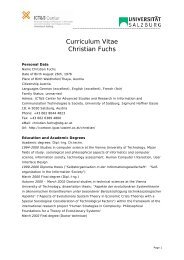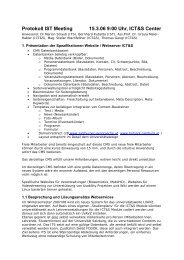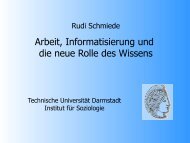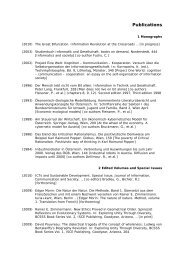ICTS AND SOCIETY: THE SALZBURG APPROACH - ICT&S
ICTS AND SOCIETY: THE SALZBURG APPROACH - ICT&S
ICTS AND SOCIETY: THE SALZBURG APPROACH - ICT&S
Create successful ePaper yourself
Turn your PDF publications into a flip-book with our unique Google optimized e-Paper software.
ICTs and Society: The Salzburg Approach<br />
finds three levels of critique: analytical critique that is sceptical of claims for novelty,<br />
explanatory critique that grasps the mutual shaping of technology and society,<br />
and ideological critique that contests dominant world views and argues for change<br />
for the better. A critical theory thus is a theory that contains a certain standpoint.<br />
Sandra Harding, resuming the famous notion of critique Karl Marx laid out in the<br />
“Introduction to the Critique of Hegel’s Philosophy of Right” that grasps “the root of<br />
the matter” and is based on the “categoric imperative to overthrow all relations in<br />
which man is a debased, enslaved, abandoned, despicable essence” (Marx 1844,<br />
385), has coined the notion of strong objectivity, which means to “start thought<br />
from marginal lives” (Harding 1992, 581), to start “from the activities of those who<br />
are necessarily disadvantaged in a particular kind of social order” (Harding 1992,<br />
584) and to “generate scientific problems” “not from the priorities of funders or<br />
dominant policy groups, but from outside these conceptual frameworks, namely<br />
from the lives of marginalized people” (Harding 1992, 582). Based on such a notion,<br />
critical ICT&S Research can be conceived as identifying and analysing antagonisms<br />
in the relationship of Internet and society, it shows how the Internet is<br />
shaped and shapes the colliding forces of competition and cooperation, it is oriented<br />
on showing how domination and exploitation are structured and do structure<br />
the Internet and on how class formation and potential class struggles are technologically<br />
mediated, it identifies Internet-supported not-yet realised potentials of societal<br />
development and it radically questions structures that restrain human and societal<br />
potentials for cooperation, self-determination, participation, happiness, and<br />
self-management.<br />
According to philosophy of science and an intensive debate in the second half of<br />
the last century originating in Europe there are three dimensions along which scientific<br />
endeavours can be characterised:<br />
• first, each scientific endeavour fulfils the task of solving a problem that<br />
arises from practice in society;<br />
• second, each scientific endeavour circumscribes a domain by defining or<br />
determining its object of study;<br />
• third, each scientific endeavour uses for its investigations and deliberations<br />
methods<br />
(so you have an end, you have a starting point, and you have a means). We again<br />
refer to these dimensions in terms of aims, scope, and tools.<br />
The following table gives an overview of the characteristics by which we want to be<br />
guided in our research in an ideal-typical comparison to characteristics of conventional<br />
investigations into the field which are neither transdisciplinary nor critical.<br />
Hofkirchner | Fuchs | Raffl | Schafranek | Sandoval | Bichler 20









